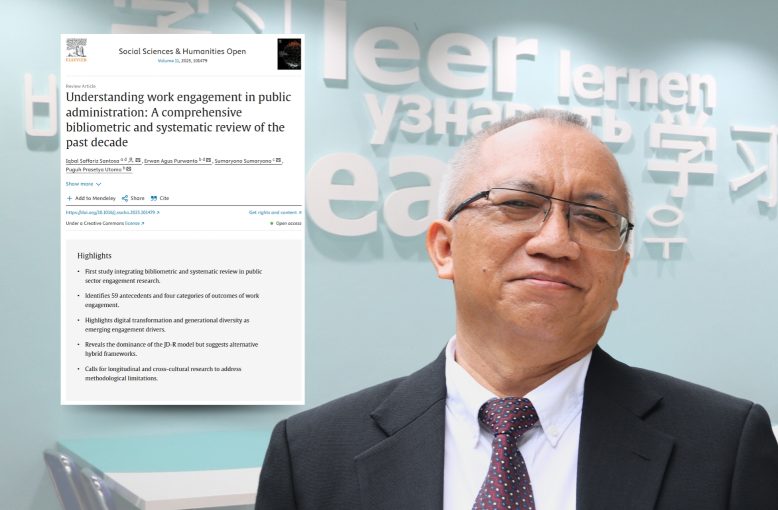
Yogyakarta, April 24, 2025 — An article titled “Understanding Work Engagement in Public Administration: A Comprehensive Bibliometric and Systematic Review of the Past Decade”, authored by Iqbal Saffariz Santosa, Erwan Agus Purwanto, Sumaryono, and Puguh Prasetya Utomo, has been published in Social Sciences and Humanities Open, Volume 11 (2025), Article Number 101479. This journal is indexed in Scopus (Q1), with a 2023 SJR of 0.691 and an Impact Score of 4.2.
This article presents a combined bibliometric and systematic review of research developments on work engagement in public administration over the past ten years. By analyzing publication trends, key keywords, and conceptual developments through a bibliometric approach, the authors identify dominant themes in public sector engagement studies as well as existing research gaps. The findings offer valuable insights for scholars and policy practitioners aiming to strengthen human resource management strategies in the public sector. The article also highlights the central role of the Job Demands-Resources Model as the dominant theoretical framework explaining the dynamics of work engagement and its relevance to the Sustainable Development Goals, particularly SDG 8 (Decent Work and Economic Growth) and SDG 16 (Peace, Justice and Strong Institutions).
Below are the abstract, keywords, and article link:
Abstract
Work engagement is essential for public sector performance, influencing motivation, productivity, and well-being. However, research in this area remains fragmented, with theoretical inconsistencies and methodological limitations. This study integrates a bibliometric analysis and systematic review to synthesize existing literature, identify key antecedents and outcomes, and highlight emerging trends. The bibliometric analysis of 143 Scopus-indexed articles maps research evolution, revealing a surge in engagement studies post-2020. The systematic review of 45 studies identifies 60 antecedents across individual, job-related, organizational, leadership, and environmental domains, along with 22 consequences categorized into individual, behavioral, job-related, and organizational dimensions. Findings indicate a dominance of quantitative cross-sectional studies, with the Job Demand-Resources Model as the prevailing framework. However, gaps persist in understanding generational diversity, digital transformation, and hybrid leadership models. To sustain engagement, public organizations must shift from performance-driven strategies to resilience-based approaches that balance motivation, well-being, and institutional constraints. This study offers a sector-specific interdisciplinary framework that bridges theoretical gaps and informs policy. Future research should incorporate longitudinal methods, hybrid theoretical models, and cross-cultural perspectives to enhance the sustainability of work engagement in public administration.
Keywords: Work engagement; Public sector; Job demands-resources model; Bibliometric analysis; Systematic review
Access the publication at:
https://www.sciencedirect.com/science/article/pii/S2590291125002074?via%3Dihub
Based on its keywords, this article supports the following Sustainable Development Goals: SDG 3 (Good Health and Well-being), SDG 8 (Decent Work and Economic Growth), and SDG 16 (Peace, Justice and Strong Institutions).
Congratulations to Mr. Sumaryono and the author team!
